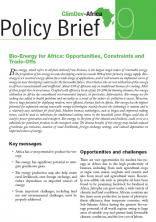Policy Brief 9 : Bio-Energy for Africa: Opportunities, Constraints and Trade-Offs

Bio-energy, which refers to all fuels derived from biomass, is the largest single source of renewable energy. The proportion of bio-energy in some developing countries exceeds 90% of their primary energy supply. Bioenergy is an essential energy option for a wide-range of applications, and it will remain an important source of energy in most developing countries for the foreseeable future. Nevertheless, the current utilisation of bio-energy in Africa is unsustainable and inefficient. About 65% of Africans rely on traditional biomass for cooking. Most of these people live in rural areas. Coupled with efficiency levels of just 10-20% for burning biomass, bio-energy utilisation in Africa has exacerbated environmental impacts, in particular, deforestation. Bio-energy use for cooking has added to health problems and mortality as a result of the indoor air pollution it causes. However, there is huge potential for deploying modern, more efficient, biomass fuels in Africa. Bio-energy has the highest
potential for expansion among renewable energy technologies, mainly because the technology is mature and is a relatively easy substitute for fossil fuels. Modern biomass technologies, such as biogas and improved cooking stoves, could be used as substitutes for traditional cooking stoves in the household sector. Biogas could also be used for power generation and transport. Bio-energy, in the form of bio-ethanol and biodiesel, could serve as a substitute for petroleum products in the transport sector. The diverse benefits of bio-energy may include reduced greenhouse gas emissions, creation of rural livelihoods, foreign exchange savings, and reduced dependence on imported sources of energy.